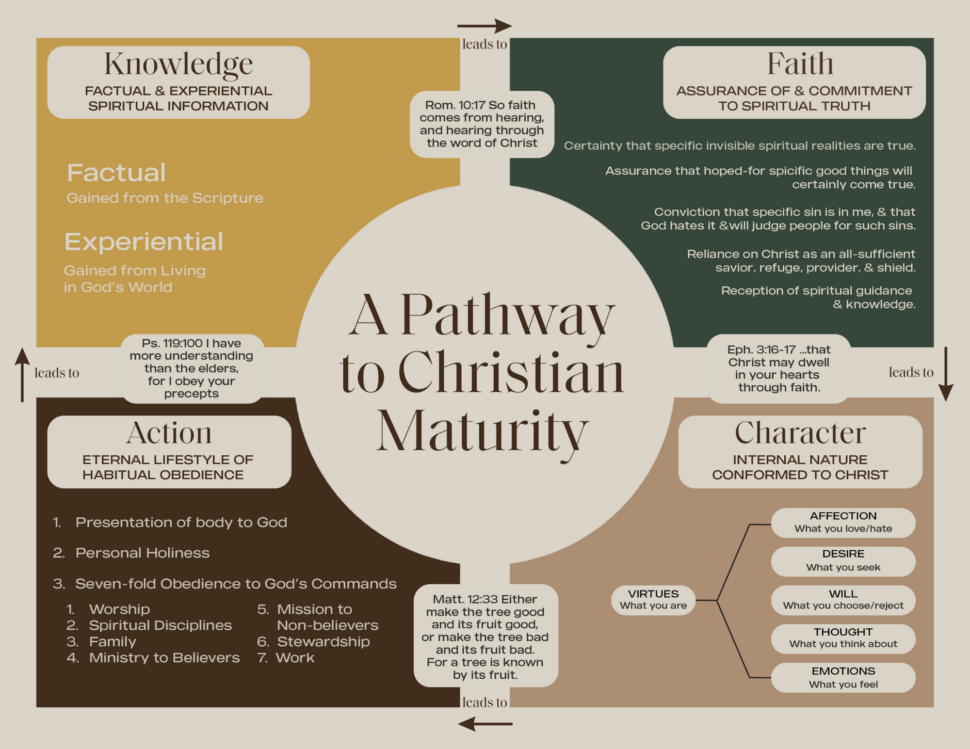
Factual information gained by Scripture and experiential information gained by living are both foundational to the sanctification process.
Knowledge:
• a wide-ranging and deep knowledge of the Bible
• a wealth of rich spiritual experience
Faith:
• a strong sense of the reality of invisible, spiritual truths-past, present, and future
• a vibrant hope in a bright future based on the promises of God
• a deep and detailed conviction of personal sin
• a firm and consistent reliance on Christ
• a consistent sense of practical guidance by the Holy Spirit
Character:
• a heart that loves what Christ loves and hates what Christ hates
• an array of passionate, godly desires that direct daily life
• a will consistently submissive to the will of God, regardless of the cost
• a thought-life that is pure and excellent
• a healthy emotional life patterned after Christ’s
• a consistent display of virtues appropriate to the moment
Action:
• a habit of constantly presenting the body to God in holy obedience
• a lifestyle pure from sin in sex, speech, relationship, and pleasures
• a consistent habit of personal and corporate worship
• a life of daily habit in prayer, Bible intake, and confession of sin
• a pattern of biblical faithfulness in marriage and parenting
• a habit of blessing other Christians with spiritual gift and general ministry
• a regular habit of bold witness to lost people
• a track record of faithful stewardship of money and generosity to others • a habit of diligent labor for the glory of God
Our Amazing Brains:
Psalm 139:14 “I praise you because I am fearfully and wonderfully made.”
Nothing in the universe is more fearfully and wonderfully made than the human brain.
The average human brain has one hundred billion neurons. Researchers estimate that the
Amazonian Rain Forest which stretches 2.7 million square miles has one hundred billion trees. Thus, a single human brain has as many neurons as there are trees in the vast, steamy jungles of the Amazon Rain Forest!
The brain is the center of memory, mood, instinct, will, emotion, decision, and all bodily functions. It is the seat of individuality and personal history; our powers of interpretation and reason are centered in the brain, and here the five senses—sight, sound, touch, smell, taste—constantly deliver their packets of information for analysis.
So it is here, in the human brain, that the battle of salvation is fought.
2 Cor. 10:3-5 We demolish arguments and every pretension that sets itself up against the knowledge of God, and we take captive every thought to make it obedient to Christ.. The human brain is the prize ground over which God and Satan have waged their infinitely unequal war.
Knowing God vs. Knowing About God
Factual information gained by Scripture and experiential information gained by living are both foundational to the sanctification process. But they are not the totality of our salvation. Jesus defined eternal life in this way: “Now this is eternal life: that they may know you, the only true God, and Jesus Christ, whom you have sent” (John 17:3). To live eternally means to know God and Christ. This “knowing” is a deep, infinite, comprehensive knowledge. It goes beyond merely knowing facts about God or having experiences that teach us things about God.
However, because knowing about God factually and experientially is essential to the “knowing” that Christ prayed for in John 17:3, it is eternally worthwhile to pursue it here on earth. Just because eternal life is more than knowing facts from the Bible and from experience does not mean we should not pursue with every fiber of our being knowledge of God and experiences with God. I believe without pursuing that kind of lower knowledge, we will never attain the final knowledge of God in heaven, because it is of the essence of the salvation God is working in us to press after all the knowledge there is of God and of Christ.
Two Basic Patterns of Discipleship: Factual and Experiential In Bible times, coins were made by striking an image (maybe Caesar’s face) into the soft precious metal using a hard pattern called a tupos. The pattern was hammered into the softer metal of the coin and forced the gold or silver to conform to the image of the pattern.
This is a picture of sanctification, for God the Father wants to conform all of us to his Son: “For those God foreknew he also predestined to be conformed to the likeness of his Son, that he might be the firstborn among many brothers” (Rom. 8:29)
God has designed a two-fold pattern (tupos) to conform us to Christ:
Sound doctrine: “What you heard from me, keep as the pattern of sound teaching, with faith and love in Christ Jesus” (2 Tim. 1:13).
Godly lifestyle: “Join with others in following my example, brothers, and take note of those who live according to the pattern we gave you” (Phil. 3:17).
By means of these two patterns, God intends to make every one of us conform to Christ. The pattern of sound teaching conforms us in our thinking, and the pattern of sound living conforms us in our actions. We are not to be innovators, inventing a new kind of disciple every generation. Each disciple of Jesus Christ is to follow with absolute conformity the pattern of sound doctrine handed down from the apostles. So also each disciple of Christ is to live a holy lifestyle in a certain pattern, including particular features such as separation from the world, spiritual disciplines (Bible intake and prayer), godly relationships, pure speech, faithful stewardship, and so forth.
These two patterns conform to the two types of knowledge presented in this chapter.
The pattern of sound teaching comes to us in words, in spiritual facts which are taught in the Bible. The pattern of sound living comes to us in the Scripture as well, but it also comes by imitating godly role models. Put in simple language, Christian discipleship consists of book learning and life learning—factual and experiential.
A City of Truth Erected in Your Mind
“Rome was not built in a day.” Anything worth building is going to take time and patience in order to build it properly. Rome took centuries to grow from a small village on the Tiber to a city that ruled the world. The astonishing buildings, like the eleven aqueducts and the breathtaking Coliseum, rose gradually as a river of building material flowed from every corner of their empire.
Similarly, God desires to build a City of Truth in the hearts of all his children. This City of Truth—sound doctrine—is erected “brick by brick,” that is, line by line of Scripture, precept by precept, truth by truth, over years of time spent in his Word and his world. Theological truths, in all their depth and breadth, take years to be established and rise to completed form in the human heart, resulting in an increasingly mature worldview by which the Christian understands everything that happens to him in this world, and by which he lives his life.
The Building Materials: Biblical Facts
• In the beginning, God created the heavens and the earth (Gen.1:1).
• Abraham believed the Lord, and the Lord credited to him as righteousness (Gen. 15:6).
• The sons of Issachar were Tola, Puah, Jashub and Shimron—four in all (1 Chron. 7:1).
• Christ died for our sins according to the Scriptures, … he was buried, … he was raised on the third day according to the Scriptures (1 Cor. 15:3-4).
• Those who accepted Peter’s message were baptized, and about three thousand were added to their number that day (Acts 2:41).
• We must all appear before the judgment seat of Christ, that each one may receive what is due him for the things done while in the body, whether good or bad (2 Cor. 5:10).
• Christ is coming with the clouds, and every eye will see him, even those who pierced him, and all tribes of the earth will wail on account of him (Rev. 1:7).
Each of those seven texts is a nugget of gold ore extracted from the Bible’s inexhaustible mine of spiritual information, and each one makes its own contribution to the growing City of Truth inside the minds of believers. From these verses, for example, we can know that God made the universe, how Abraham was justified by faith, who the sons of Issachar were, what are the basic facts of the gospel message of Christ, how the church grew on the Day of Pentecost, what judgment day will hold for each one of us, and some aspects of the future coming of Christ.
God calls us on a lifetime journey of discovery in the vast world of the biblical text. There are sixty-six books to be learned, hundreds of people and place names, overlapping chronologies, unfolding history, commands and promises, deepening themes. Some passages tell us what to do directly: “Do everything without complaining or arguing” (Phil. 2:14). Others, like Isaiah’s oracles against the nations in Isaiah 13-23, seem far removed from our daily lives. And although not every spiritual fact is equally significant, “All Scripture is Godbreathed and useful” (2 Tim.3:16). Scripture supplies fact after fact, truth after truth, all given by an infinitely wise God, and through daily Bible intake, the system of Christian theology, the
City of Truth, rises in our hearts.
Facts Combining and Recombining
Factual knowledge gained from the Bible make up the raw materials from which our minds craft the fired bricks, dressed stone, carved timbers and shimmering gold from which the City of Truth God is built. But raw biblical data must be arranged in connection with other scriptural truths building doctrines that accomplish spiritual maturity.
God has ordained that the whole physical universe should be constructed from atoms. The 118 elements (types of atoms) of the periodic table comprise all the basic building blocks of every single physical thing in creation. These same 118 elements combine in countless configurations to make all the myriad of molecules that comprise our bodily organs, and all physical matter besides. The study of how these atoms combine and recombine is called chemistry. The study of how Bible facts combine and recombine is called theology.
Perhaps the most significant example of these interconnections is the doctrine of the Trinity. The Trinity is not taught in any one text of Scripture, and that the word “Trinity” never appears in the Bible. Rather, it arises from a combination of three different doctrines, each rooted in their own series of “proof texts”: 1) that there is one God and only one God; 2) that this one God has eternally existed in three persons, each of them distinct from each other; 3) that these three persons (Father, Son, Holy Spirit) are equally God. Each of these ideas is found in Scripture, arising from the pages of the Bible by the rules of human language and a right use of reason. Therefore, it is right to call the doctrine of the Trinity “the Word of God.” From these kinds of combinations, the theological City of Truth rises within the heart of a believer.
From these things also, a whole life is transformed gradually, over years, by the Word of God.
A River Rock vs. a Forest Rock
Imagine you were walking through the woods in a mountainous region and stopped by a rushing river. You bend down and dig up a rock from the forest floor. Then you go to the river’s edge and scoop up a rock made from the same material from the riverbed. You look at the two rocks… both granite. What’s the difference? The most obvious is the forest rock is covered with dirt, but the river rock is clean. However, there is a deeper difference. If you were to swish the forest rock in the river for a minute, now both of them would be clean from dirt… but the river rock would be perfectly smooth, whereas the forest rock would still have jagged crystalline edges. How could you change the forest rock to make it like the river rock? Simple! Put it in the river again! For how long? I have no idea!! But probably years. And day after day, year after year, the sand would be carried by the constantly rushing water over the surface of that rock, transforming it till it is smooth as silk.
So it is with the transformation of a Christian from immature to mature. Some clomped dirt particles (sin habits) get washed off immediately after conversion, but the rest of the change is much more difficult. Transformation only comes by immersing the mind in the Word of God, allowing it to wash over our thoughts until gradually we have learned to think as Christ does. And this is precisely what Paul is commanding us to do in Romans 12:2: “Do be conformed to this world, but be transformed by the renewing of your minds.” What is the renewing of our minds? We are to train our brains to think in new ways, patterned after Christ and after all the new things he is doing and will do in salvation.
How is the mind to be thus renewed? It is only by consistent immersion in the Word of God. It is the unique role of the written Word of God, as illuminated and applied by the indwelling Spirit, to change the way we think and therefore the way we live. As we have already noted, the human mind is the battleground between the Spirit and Satan, and between the Spirit and the flesh. A depraved mind leads to a depraved life. A transformed mind leads to a transformed life.
Ephesians 4:17: “So I tell you this, and insist on it in the Lord, that you must no longer live as the Gentiles do, in the futility of their thinking.” If we are going to live a new life, we must think in a new way. That transformation is precisely what the Bible is capable of doing.
Christ Opened Their Minds to Understand the Scriptures
The mind of the Christian, then, must be transformed by a constant renewing process, and the whole body and life will follow. Thanks be to God, Christ has power directly over the human brain to make it new. He does this in particular by opening it to the Word of God. Satan had blinded us to spiritual truth. At regeneration, this blindness is removed by faith. But progressive spiritual sight is given to us by Christ’s power to open our minds to biblical truth, as he did to his disciples after his resurrection: “Then he opened their minds so they could understand the Scriptures” (Luke 24:45). Christ continues to do this direct work in us by the Holy Spirit as we grow in biblical understanding. By this, we grow in sanctification, more and more conformed to Christ.
Scripture the Alpha and Omega of Faith in Christ
God has ordained that we will come to know Christ, believe in him, and grow up to maturity in him in one way alone, by the testimony of Scripture. Thus Scripture’s testimony to the person and work of Christ is indispensable to our faith. Apart from Scripture, we know literally nothing about Jesus. It is for this very reason that Paul links hearing the word of God to faith in Christ: “Faith comes from hearing, and hearing through the word of Christ” (Rom.10:17). Faith finds its origin in the hearing of the Word of God. But faith in Christ also finds its ongoing existence, nurture, strength, growth and health in the same “Word of Christ.” By Scripture alone, we continue to grow in our knowledge of Christ. The Scripture is both the Alpha (first letter) and the Omega (last letter) of faith in Christ, and every letter in between. No believer can maintain a healthy and growing faith in Christ without constant nourishment in the
Word of God.
The Vine and the Branches: “Remain in My Word”
[Jesus said] I am the vine; you are the branches. If a man remains in me and I in him, he will bear much fruit; apart from me you can do nothing…. If you remain in me and my words remain in you, ask whatever you wish, and it will be given you. This is to my Father’s glory, that you bear much fruit, showing yourselves to be my disciples. (John 15:5-8)
This poignant image is essential for understanding sanctification, and the role of Scripture’s testimony to Christ for spiritual life, health, and growth. Simply put, Jesus is saying “Live constantly in me, and do it by allowing my words to live in your mind and by obeying what they command. If you do this, you will bear eternal fruit.”
The Ministry of the Word Produces Maturity
In Ephesians 4, Paul taught the church of the existence of spiritual gifts leading to varying roles that Christ gives to different believers to play in the growth of the church (Eph. 4:7). The roles he mentions—apostles, prophets, evangelists, pastors, teachers—are united in this one thing: they are the delivery system for the Word of God to the church. And it is the Word of God that primes the pump for all the ministries of the church which build the church from immaturity to maturity in Christ: “to prepare God’s people for works of service, so that the body of Christ may be built up until we all reach unity in the faith and in the knowledge of the Son of God and become mature, attaining to the whole measure of the fullness of Christ” (Eph. 4:12-13). Paul’s description of that maturity focuses primarily on doctrinal knowledge: “Then we will no longer be infants, tossed back and forth by the waves, and blown here and there by every wind of teaching and by the cunning and craftiness of men in their deceitful scheming. Instead, speaking the truth in love, we will in all things grow up into him who is the Head, that is, Christ” (Eph. 4:14-15). Immature people are easily swayed by false teaching, but mature people instead “speak the truth (i.e. right doctrine) in love (i.e. right character)”, and by doing this more and more we make progress in the internal journey toward Christlikeness.
Experiential Knowledge
John Calvin called the physical universe the “theater of God’s glory.” As we look in wonder at the uncountable starry host of the Milky Way, the snow-capped grandeur of the Rocky Mountains, the purples and reds of a sunset over the Grand Canyon, or the thunder of crashing waves on the seashore after a severe storm, we have a sense of the greatness and majesty of God. God has put his glory on display in the physical world.
In a similar way, God has unfolded his wisdom and attributes in redemptive history, by his sovereign control of events in daily life all around the world. Thus the physical universe and the unfolding of human events are both vital sources of spiritual information. They are together not just the “theater of God’s glory” but the university for Christian maturity. Spiritually mature people not only have a vast array of biblical facts stored up in their heads but also possess a wide variety of spiritual experiences in God’s world that have shaped their minds and helped them grow. Thus there are two vital sources of the knowledge that leads to godliness: God’s Word and God’s world. There is factual knowledge and there is also experiential knowledge. Now, these are not equally clear forms of communication from God. Scripture interprets all human experience. But apart from daily life experiences, we cannot understand Scripture, and God has ordained that these life experiences are essential to our growth in Christ.
Real Life Illuminates Scripture
Ephesians 4:2 Be completely humble and gentle; be patient, bearing with one another in love.
The storehouse of experience in the world continues to expand throughout our lives, and it enables us to understand scripture. Take the verse cited above. In life, we meet people who are both humble and prideful, both gentle and harsh, both patient and impatient, both loving and unloving. The knowledge base is incessantly augmented by these experiences.
Furthermore, we see ourselves behaving in all of these ways: sometimes obedient to
God’s commands, sometimes disobedient. Real life gives meaning to the words on which Scripture depends, and Scripture in turn interprets real life experiences. Every day we live in this world expands our life experiences and makes us more and more ready to understand the all-sufficient Scripture. It is the Scripture that sanctifies, but it does its work in a context of an ever-growing storehouse of experience.
Biblical Examples of Learning by Experience
Some things just cannot be fully explained in a book, but only learned by experience.
The Bible is full of examples of learning by experience:
Moses’ Arms Lifted in Prayer: Exodus 17:8-13
Israel Humbled and Trained in the Desert
Paul and Contentment: “I know what it is to be in need, and I know what it is to have plenty. I have learned the secret of being content in any and every situation, whether well fed or hungry, whether living in plenty or in want” (Phil. 4:12).
Daily Lessons in God’s Love
One of the most vital lessons God teaches us by experience is how much he loves us and how completely he cares for our needs. The doctrine of providence—God’s sovereign control over daily life events—is taught in many texts of Scripture:
• Are not two sparrows sold for a penny? Yet not one of them will fall to the ground apart from the will of your Father. (Matt. 10:29)
• The lot is cast into the lap, but its every decision is from the Lord. (Prov.16:33) A mature Christian has a much more developed sense than does an immature one of
God’s active control over daily life, and especially of his provision for his children.
Discipline for Sin: Learning by Bitter Experience
Another vital form of knowledge gained by experience is God’s loving discipline of his sinning children. Hebrews 12:5-11 teaches this plainly, that God as a loving father disciplines every son he receives, to train us to hate sin and love him. These lessons are only learned by suffering through daily life hardships that God brings on us when we sin.
Suffering: The Graduate School of Spiritual Experience
“Consider it pure joy, my brothers, whenever you face trials of many kinds, because you know that the testing of your faith develops perseverance. Perseverance must finish its work so that you may be mature and complete, not lacking anything” (James 1:2-3).
Not only so, but we also rejoice in our sufferings, because we know that suffering produces perseverance; perseverance, character; and character, hope” (Rom. 5:3-4).
Scripture is encouraging us to have a supernatural reaction to suffering. We are to rejoice in it, because we have been instructed by factual knowledge gained in the Scripture that suffering is forever linked to the development of proven character. Only by the testing of our faith will our character be developed and our hearts be transformed, so that who we really are is revealed.
Discipleship by Role Modelling
In Philippians 3:17, Paul speaks of those who “live according to the pattern you have in us.” As we said at the beginning of this chapter, Christian discipleship must follow two patterns (tupos) for the individual to be conformed to Christ. The book learning part comes from studying the words (doctrines) of the Bible. The life learning part comes from following daily life examples in godly role models. Paul was an excellent role model, saying, “Follow my example as I follow the example of Christ” (1 Cor. 11:1). Some things in Christian discipleship have to be both taught and caught. The mentor has to show the disciple that something is taught in the Bible (like the need for a daily Quiet Time or doing evangelism), and then give the disciple a clear example to follow.









